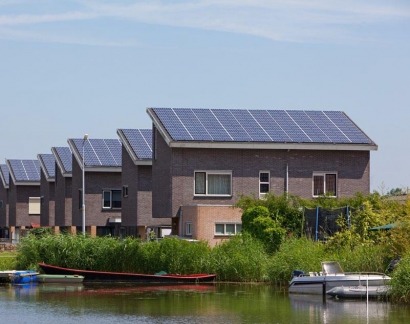
Sun-Edison’s study “Enabling the European consumer to generate power for self-consumption,” prepared in cooperation with the strategy consultancy A.T. Kearney, outlines a vision of solar photovoltaic (PV) self-consumption in Europe.
It also offers an explanation of the benefits that PV self-consumption brings to policy objectives as well as electricity consumers, namely: 1) Driving energy efficiency by consumers, 2) Leveraging private investment for renewable energy expansion, 3) Improving grid stability, 4) Developing innovative technological solutions, and 5) Enabling participating and acceptance by consumers.
Sun-Edison reports that PV self-consumption is already happening around the globe. It exists as an incentive scheme or as a competitive business - or as a mix of the two. However, it warns that “there is no competitive model yet that would enable self-consumption and would have direct relevance to Europe – the future model needs to be developed”.
The authors of the report continue that “today, legal and economic barriers to self-consumption prevent self-consumption from growing to its full potential in some of the key EU markets. While self-consumption is growing in some incentivized markets, the ground still needs to be prepared for growth when competitiveness is reached.”
Tomas Garcia, Sun-Edison’s Director of EMEA & LATAM Strategy and Market Development and one of the report's authors, told Renewable Energy Magazine that "a common regulation in EU countries would greatly facilitate the implementation of self-consumption and the PV net balance in Europe". Furthermore, Garcia notes that to date, there is no single definition or agreement on the term self-consumption, which complicates debates about the concept.
However, Sun-Edison’s study does provide a broad and comprehensive definition of PV self-consumption as “The possibility for any kind of electricity consumer to connect a photovoltaic system, with a capacity corresponding to his/ her consumption, to his/her own system or to the grid, for his/her own or for on-site consumption and feeding the non-consumed electricity to the grid and receiving value for it”.
Tomas Garcia notes that "one of the most interesting elements of this definition is that individuals do not need to own the facility to benefit from self-consumption as the facility can be shared by various electricity consumers". It also opens the door to a broader conception of self-consumption, enabling energy to be consumed for self-sufficiency without the power generating system actually being located on one's home. It could be located on other buildings such as housing developments, shopping centres, factories, etc.
Regulatory reform needed
However, in order for self-consumption to become mainstream, Sun-Edison explains that several steps are required to strengthen the concept of self-consumption in the current or emerging Directives pertaining to energy. “This appears to be feasible today and should be implemented at the next possibility,” they say.
Starting with the Internal Energy Market Directive: The focus on the consumer should be strengthened and self-consumption as another consumer choice explicitly mentioned, in addition to the choice of different electricity providers.
Second, the Renewable Energy Directive could be enhanced by adding focus and explicit mention on renewable sources self-consumption. National Renewable Energy Action Plans should include, at least, policies and actions to support self-consumed renewable energy, identifying and eliminating existing barriers.
Finally, in the recently proposed draft Energy Efficiency Directive, self-consumption should be explicitly defined and noted as a significant way to foster energy efficiency. Also, it needs to be ensured that metering/ billing rules fully support self-consumption.
Self-Consumption Directive
Sub-Edison then describes a second stage in this process with involves defining a separate “Self-Consumption Directive” that establishes a “right to generate energy for self-consumption” should be considered in parallel.
Such a Directive will be needed as competitiveness of PV and other distributed generation technologies will make self-consumption a dominant rather than a niche phenomenon that needs to be understood and regulated holistically across Member States,” say the report’s authors. “At this stage, we find it advisable for the European Commission to commence a formal green/ white paper process, during which it could be determined, if, when, and with what exact scope such a self-consumption Directive could be a suitable pillar of the evolving policy landscape.”
If such measures are taken to a strengthen self-consumption, Sun-Edison is confident that electricity consumers would be the first to benefit. “It would improve their opportunities to choose how they would like to supply some or all of their power needs. Of course, the consumers that might not be able to invest in generation for self-consumption also need to be considered. A fair allocation of grid and other fixed costs needs to be ensured so that self-consumption is not implemented on the backs of those who are not able to invest, balanced by the benefits that PV self-generation can provide to the grid,” says the report.
Grid operators would also benefit from a shift from “maximum feed-in” to “increase of self-consumption,” which would mitigate/ delay some of the system enhancement upgrades otherwise needed. “That said, self-consumption would still bring its challenges to the overall system management that can further accelerate the transition to smart distribution grids. On the transmission side, any improvement in the alignment between consumption and generation will decrease pressures in the system and strategic deployment should be considered,” warns Garcia and his co-authors.
As concrete next steps, Sun-Edison recommends the following actions for the short to mid-term:
www.sunedison.com
For additional information:

